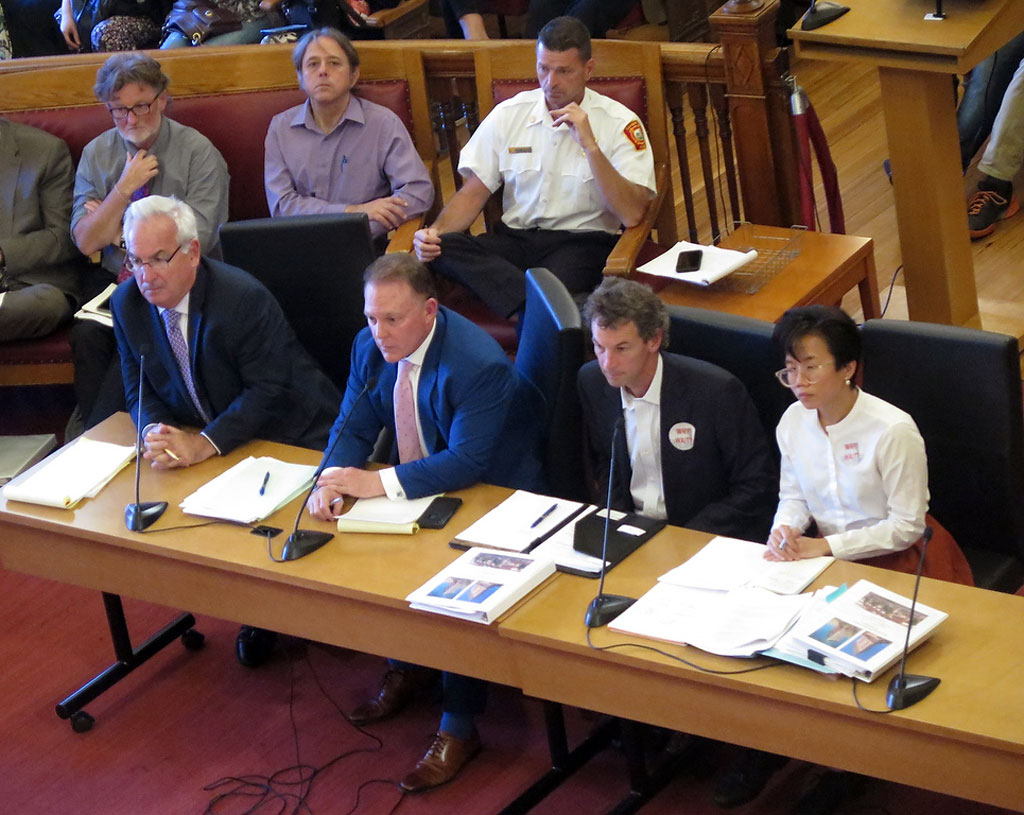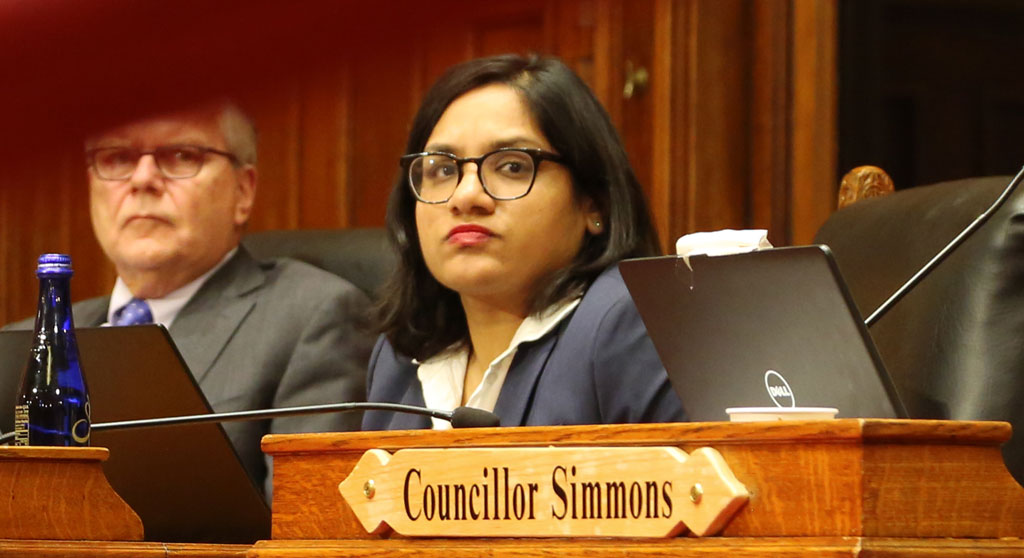Siddiqui demands more affordable housing, less parking to see courthouse plan pass 6-3

City councillor Sumbul Siddiqui, seen in January, cut a deal Wednesday to see a courthouse redevelopment plan go through. (Photo: Joshua Qualls)
Recognizing her power as the deciding vote on granting parking spots needed for reuse of East Cambridge’s former courthouse, on Wednesday city councillor Sumbul Siddiqui extracted further concessions out of developer Leggat McCall Properties: a doubling of affordable housing units to 48; a reduction in the number of parking spots requested; and another $3.5 million for the Affordable Housing Trust, for a total of $8 million.
The surprise proposal came toward the end of a special council hearing, continued from Monday when it reached the five-hour mark mainly by taking public comment from around 100 people on both sides of the issue. With Siddiqui’s “contingencies” agreed to by the developer, she became the crucial vote in a 6-3 majority – if Leggat McCall hadn’t agreed, she may yet have joined with vice mayor Jan Devereux and councillors Dennis Carlone and Quinton Zondervan as a fourth vote blocking the parking disposition at the city-owned First Street Garage.
“I know I’ve disappointed people,” Siddiqui said. “I know I’m letting a few people down either way. But I’ve spent many weeks and many months thinking about this.”

The team representing developer Leggat McCall Properties on Wednesday included attorneys James Rafferty and Anthony Galluccio and executives Rob Dickey and Duong Huynh. (Photo: John Hawkinson)
A “no” vote from Siddiqui would have upended a plan in place since December 2012, when the state named Leggat McCall the winning bid to redevelop the 20-story Edward J. Sullivan Courthouse at 40 Thorndike St.
Opponents of the project hoped to see the land kept in the hands of the public as housing – ideally as all affordable housing – built to a scale that fit better into the neighborhood.
The building has been empty since June 2014, and deteriorating under the watch of the state Division of Capital Asset Management and Maintenance to the point that residents living nearby have worried about their health. A lawsuit and appeal, and then a battle over the parking disposition, delayed work at the courthouse by the developer. Just Tuesday Leggat McCall had received a one-year extension on its special permit from Cambridge’s Planning Board; the company has also had to make renewals of its purchase and sale agreement with the state. Rob Dickey, an LMP executive vice president, said Wednesday that the building had cost it around $10 million without even breaking ground.
The company bid $33 million for the property and says remediation of the building – which was began emptying starting in 2008 because it was riddled with asbestos – could cost $50 million. Dickey said Sept. 5 that LMP had made no requests of the state to maintain the property against deterioration, and had never recalculated its 2012 bid to see if the deal still made financial sense.
“Market is hot”
The nearly seven-year delay saw a continued surge in the value of office space, a fact Siddiqui confirmed with Leggat McCall and its attorneys at the hearing before making her proposal: that being able to charge higher office rents meant the company could still profit by subtracting office space to add affordable housing, and even by upping its contribution to the Affordable Housing Trust.
“As you said, the market is hot, and I think this is a reasonable request,” Siddiqui said. “This is what I would need for a yes vote.”
While a parking reduction of 125 spaces had already been proposed by Leggat McCall, she asked for even more spaces to be given back to the city – amounting to an additional 25, in line with the new affordable units – and for a good faith effort by the company to fulfill a promise for child care by finding a local nonprofit to run it, instead of a pricey chain.
In addition to the parking, Wednesday’s special hearing also saw the disposition of 9,000 square feet of retail space at the garage for a senior center, cafe, demonstration kitchen and three-day-a-week farmers market. (A remaining 3,000 square feet of retail space will stay in city hands, kept for a Department of Public Works sign shop.)
Developer promises speed
Devereux, rolling with Siddiqui’s unexpected dealmaking, asked for a timeline on seeing the retail space transformed into the public uses, but Anthony Galluccio, an attorney for Leggat McCall, dodged by pointing out the complexity of dual construction sites – the courthouse and garage are on separate but adjacent blocks – with potentially separate building permitting processes.
Zondervan, meanwhile, objected to an immediate vote on a radical change to a long-standing proposal that members of the public hadn’t been able to comment on. It was a “fair question” on an “unusual” process, Mayor Marc McGovern said, but it’s not unusual to see radical, last-minute amendments to special permits and giant “planned unit developments” in Cambridge.
Leggat McCall must now go to the Planning Board to seek approval on changes to its special permit in line with Siddiqui’s deal. “Time is of the essence,” Galluccio said, while Dickey said that the company was “committed to move this forward as quickly as possible, including the amendments to the special permit and including the physical condition of the building.”
Despite Zondervan’s objections, the question remained before the council, with Siddiqui’s amendments accepted 6-3, followed by passage of the amended order at the same 6-3 split.
Backers of the courthouse project were ebullient afterward. Henry Wortis, a Berkshire Street resident opposed to the project, called the new affordable units “24 fig leaves” and nodded to the amount of profit Leggat McCall must expect to make there: Losing 24,000 square feet of office space and paying an additional $3.5 million to the Affordable Housing Trust “didn’t bother them at all,” Wortis said.




If Rob Dickey never reran the numbers, then LMP should fire him immediately.
There’s no “child care facility”; there are two child care rooms. I doubt Bright Horizons is clamoring for two rooms. Similarly, no matter how many times Anthony Galluccio claimed there’s a “senior center”, there isn’t. There’s a so-called community room that will have some unspecified part-time programming for seniors. I got this information last month from Michael Delia of East End House.
I heard no promises about the size of these 24 additional affordable apartments, so, for all we know, we’ll be getting 24 tiny studios.
I’ll agree with one thing. The City’s disposition ordinance requires that the disposition report include two appraisals of the value of the property proposed for disposition “to the proposed lessee”. It’s obvious after today’s exercise in non-democracy that the Manager never came close to making that evaluation, and the lack of appraisals in his report is just icing on the cake. Councillor Siddiqui came a lot closer than the Manager and his crackerjack financial genius crew did, but the speed with which LMP agreed to the deal strongly suggests that she didn’t come close enough to what the law requires. Still, it’s blindingly obvious that the requirements of the law were never a priority for this collection of running dogs.
Yes. Given the ebullience of the development team that they added the cost of 24 more units, lost parking spaces, and increased the Affordable Housing Trust payment by $3.5 million, it’s clear the city didn’t ask enough, even with Siddiqui’s changes. We rarely do.
Thank God this passed! This building would be sitting vacant for another decade without this compromise. Nice job Sumbul Siddiqui for pushing a pragmatic compromise.
It says a great deal about Cambridge politics that Mark McGovern who receives political campaign funds from Anthony Galluccio, has no shame in negotiating with him about the conditions of sale of the courthouse.
Good negotiations and glad that his passed. Now lets get it done!!! If this again goes to court again, there will only be one winner from this entire saga – the lawyers.
Peace Be Unto You,
All of the Sullivan Court properties should have should have went toward ending and eradicating homeless. Criminally, it didn’t happen. Anytime that municipal policy makers vote to pass something that is criminal, there stands an imbalance of justice.
Yours In Peace
Hasson Rashid
Given the status of the votes, I wonder how much horsetrading went on behind the scene prior to the grandstanding. To have that agreement “off the top of your head” is rather doubtful, how much did she talk with her fellow proponents, what really went on with the lawyers. This was far from magnanimous or spontaneous and also exposed Sumbul’s lack of savvy in negotiations. It wasn’t big enough. AND if she had voted against the parking, other arrangements and plans would have been made and negotiated– hopefully with the public at the table. There was no opportunity for the public to come back with comments. The mayor is great at this kind of horse-trading behind the scene. Good luck Sumbul.